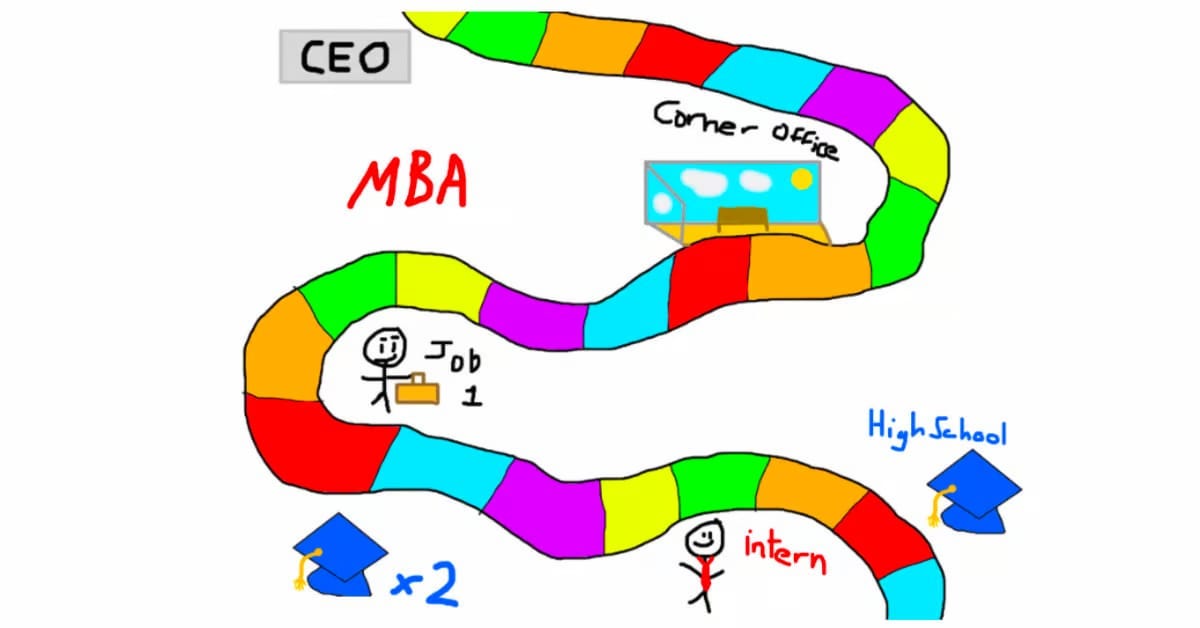No Rules.
Your career is more malleable than you think.
Welcome to Young Money! If you’re new here, you can join the tens of thousands of subscribers receiving my essays each week by adding your email below.
Humans love certainty and, more importantly, hate uncertainty. Luckily, our minds have a knack for identifying patterns in our environments, providing clues to remove some of that uncertainty. Thousands of years ago, this pattern identification was a valuable risk avoidance mechanism: if you recognized that a rustling bush could represent a threat, for example, you would avoid suspicious bushes and stay alive longer.
Today, however, our propensity for identifying patterns creates problems, when we assume that patterns are rules. And we mistake patterns for rules all the time.
With my business school graduation around the corner, I’ve taken some time to think about the future. The future is intimidating, because it’s filled with uncertainty about what we’ll do with the rest of our lives. I think all graduates go through something like this.
To reduce these uncertainties (and our anxiety), we look for patterns in our job choices and extrapolate from there. We tell ourselves, “I need to get this job, and work here for 2-3 years, so I can get the next job, and after that job, I will…” By looking at how others have navigated their careers before us, we quietly put ourselves in certain boxes. The junior copywriter will be a marketer. The banker is destined to work in finance. The journalist hopes to eventually become an editor-in-chief. We allow the decisions that we make in our youth to guide the rest of our lives.
Those are the choices that we made, and we think those choices set the rules.
But it’s important to remember that there are no rules, and we can choose who we are and what we do every single day.
Something I’ve noticed since starting my new job as a writer is just how diverse the label “writer” is. When most folks think of writers, they think of journalists who cover different industries and break the news on stories. But even within the narrow scope of “journalists,” there is so much variety. Some journalists cover finance, and within that, markets, and within that, venture capital and public equities and commodities. Other journalists cover sports, business, politics, and pop culture.
Some writers, like me, apply a layer of commentary to the news. More often than not, I’m not telling readers what happened as much as I am why it matters. Some writers are pure essayists. Some are fiction novelists, others write biographies and histories.
Some writers are equity researchers and hedge fund analysts, while others are copywriters, crisis comms strategists, and marketing executives. The scope of “writing,” as a profession, is infinite, because writing isn’t a profession. It’s a skill. And fine-tuned skills are valuable in a variety of “jobs.”
Replace “writer” with teacher. Investor. Coach. If you only think about your career in terms of the job you do and other jobs that immediately progress from your current role then, yes, there are “rules” on what you may be able to pursue.
But if you think about your career from the perspective of which skills you have developed and where else they might be applicable, you’ll realize that opportunities are near-infinite. Journalists can become investors. Corporate executives can become authors. Even in the case of the most rigid disciplines such as law and medicine, nothing is stopping you from going back to school right now, if you want to change course. You can reinvent yourself tomorrow if you’d like. The only “rules,” if any, are those that exist in your head. They’re self-imposed.
Career paths feel linear because linear is simple, and we crave simplicity, but it doesn’t have to be this way. I think that when we’re young, the fear of the unknown pushes us down certain paths, and we tell ourselves that our lives are now defined. But these stories we tell ourselves are just that: stories. Yes, every decision we make impacts our future decisions. But no decision, especially in our professional lives, has to be permanent.
This is as much a reminder to myself as it is a message to anyone else: There are no rules.
- Jack
I appreciate reader feedback, so if you enjoyed today’s piece, let me know with a like or comment at the bottom of this page!
Young Money is now an ad-free, reader-supported publication. This structure has created a better experience for both the reader and the writer, and it allows me to focus on producing good work instead of managing ad placements. In addition to helping support my newsletter, paid subscribers get access to additional content, including Q&As, book reviews, and more. If you’re a long-time reader who would like to further support Young Money, you can do so by clicking below. Thanks!


